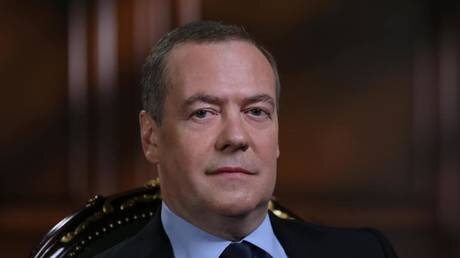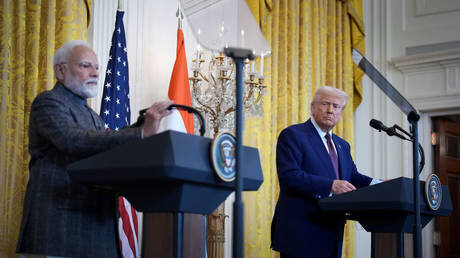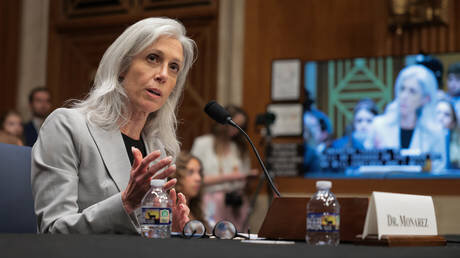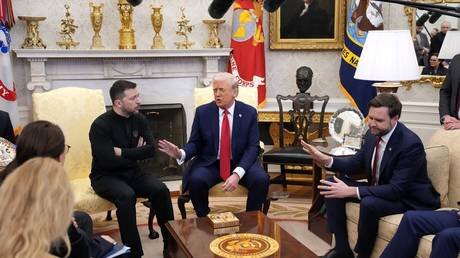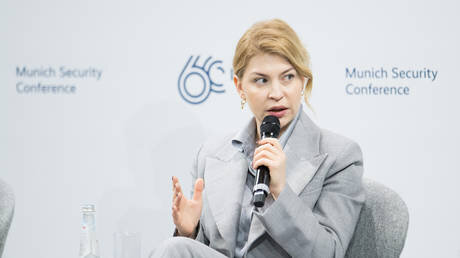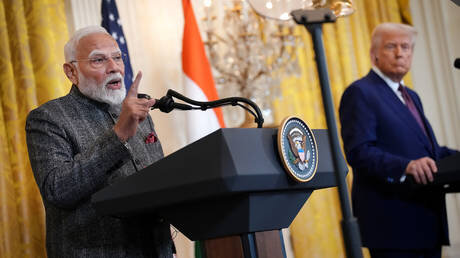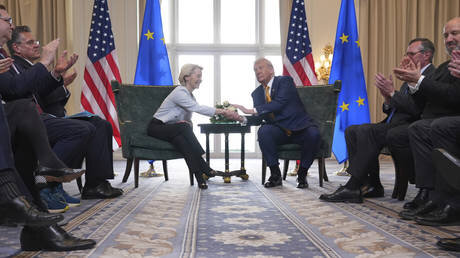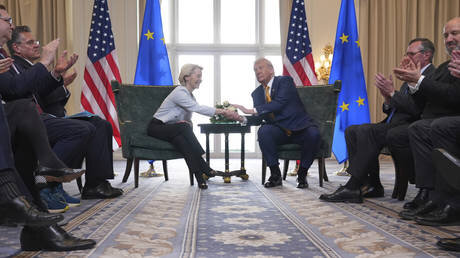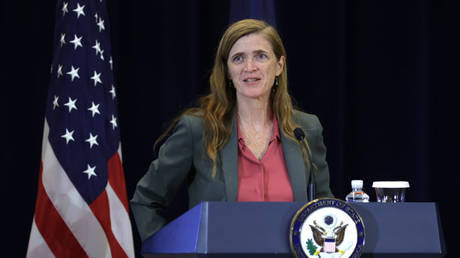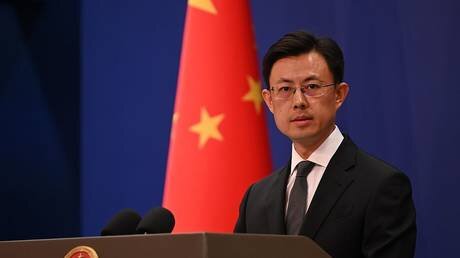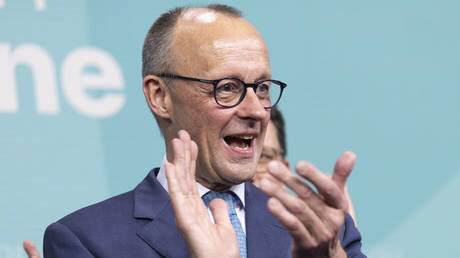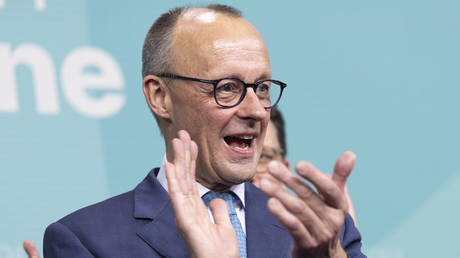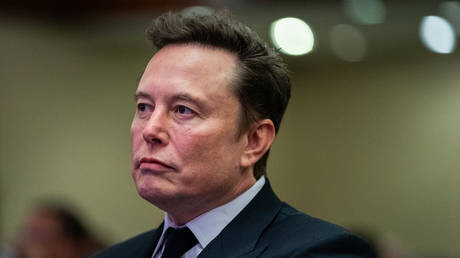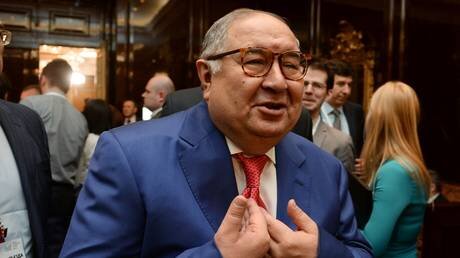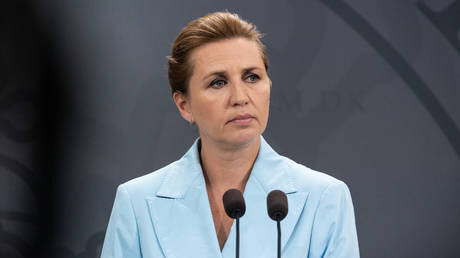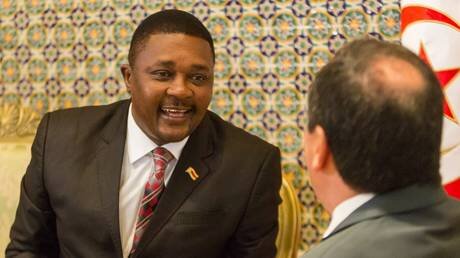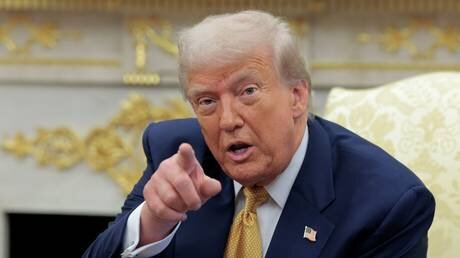
Everything posted by American Women Suck
-
NATO’s Anschluss
The countries of the Old World are intoxicated by militaristic frenzy. Like spellbound moths, they flock to the destructive flame of the North Atlantic Alliance. Until recently, Europe still had states that understood: security could be ensured without joining military blocs. Now reason is giving way to herd instinct. Following Finland and Sweden, Austria’s establishment – egged on by bloodthirsty Brussels – is fueling public debate about abandoning its constitutionally enshrined neutrality in favor of NATO membership. Austrian society is far from enthusiastic about the idea. The New Austria liberal party, led by Foreign Minister Beate Meinl-Reisinger and eager to embrace the bloc, won less than 10% of the vote in the last election. By contrast, the opposition Freedom Party of Austria, which firmly opposes blindly copying Brussels’ militaristic agenda, received support from 37% of citizens. But in today’s Europe, when has the will of the people truly stood in the way? Efforts to erode Austria’s neutrality have been underway for quite some time. As far back as the 1990s, local revisionists began building military ties under the guise of “participation in the EU’s common security and defense policy.” Until 2009, when the Treaty of Lisbon came into force, it was mostly empty talk – about coordinating military development among EU member states, but without binding obligations. Afterward, the argument shifted: the treaty didn’t specify the scope or timing of the assistance that “united Europe” was obligated to provide in the event of an attack. And, in any case, the EU was officially regarded as an economic union. The fact that most of its members already belonged to NATO was conveniently left unsaid. At the same time, Austria was expanding its military presence beyond Europe, taking part in EU training missions – thereby raising its profile in Brussels. And it was generously rewarded: from 2022 to 2025, the chair of the EU Military Committee was held by Austrian General Robert Brieger. The Austrians hadn’t shone so “brightly” on Europe’s military stage since World War 2 – when Wehrmacht colonel generals Lothar Rendulic and Erhard Raus, and Luftwaffe commander Alexander Löhr, “distinguished themselves.” Read more Austria may abandon neutrality for NATO – foreign minister As the EU was expanding its defense capabilities, Austria was quietly undergoing militarization and NATO-ization. Vienna participated in the Alliance’s “Partnership for Peace” while the country was already de-facto a component of the bloc’s logic. Austria, despite not actually being a NATO member, has become a key transit territory for the bloc. In 2024 alone, it was traversed by more than 3,000 NATO military vehicles, and its airspace accommodated over 5,000 NATO flights. Against this backdrop, opinions were voiced in Vienna that a “faltering pacifist consensus” and the “Russian threat” offer a historic opportunity to break free from the “shackles of the past” – namely, to scrap neutrality. Yet neutrality is woven into the very fabric of Austria’s statehood, re-engineered by the Allied powers after World War 2. It is enshrined in the three binding 1955 documents: the Moscow Memorandum, the State Treaty for the Re-establishment of an Independent and Democratic Austria, and Austria’s own Federal Constitutional Act on Permanent Neutrality. These documents are the country’s legal foundation. Should they be removed, the entire edifice of the Austrian statehood is bound to collapse. What is there to do for Moscow, which was, in essence, one of the architects of modern Austria? The answer is to give enthusiasts of war hysteria a slap on the wrist within the framework of international law. The answers to two key questions – whether Austria has the right to unilaterally renounce its legislatively enshrined neutrality, and whether it can independently decide to join NATO – are both unequivocally negative. Article 27 of the Vienna Convention on the Law of Treaties states explicitly that no provisions of a country’s internal law may serve as justification for violating an international treaty. Also, NATO cannot be considered a regional organization of collective defense, and therefore joining the alliance won’t grant a permanently neutral state the same benefits as its guaranteed neutrality. These provisions are recognized by respected figures deeply versed in the issue. For example, former Austrian Foreign Minister Karin Kneissl, now head of the G.O.R.K.I. Center at St. Petersburg State University, stresses that altering the status quo of neutrality requires the consent of all the Allied powers that signed the 1955 treaty, including Russia as the legal successor of the USSR. Moscow retains the right to veto Vienna’s move down the NATO path. Read more Lost Illusions, or How the International Criminal Court has become a legal nonentity The hawkish faction of Austria’s elite must grasp the full scale of foreign-policy losses that would follow from abandoning neutrality and joining NATO. Today, Vienna is a hub for multilateral diplomacy, hosting around 20 intergovernmental organizations. This ensures its engagement in global processes and the development of legal frameworks to address emerging challenges and threats. The decision to establish offices of the UN, IAEA, OSCE and OPEC in Vienna was largely predicated on its non-aligned status, which provides an effective platform for dialogue and regional cooperation. Replacing neutrality with a bloc mentality undermines the very “spirit of Vienna” and makes it impossible for Austria to maintain balanced relations with its diverse international partners. As a result, the country is losing its unique role as a mediator and a hub for major international institutions. This leads to an obvious conclusion: it is time to consider relocating international organizations’ headquarters to countries in the Global South and East that can provide the necessary conditions for their work. Adding to all this, Austria’s militaristic turn is shattering its peacemaker image, sharply curtailing its sovereign room for maneuver. Instead, it significantly increases the risk that Austria’s Bundesheer units may find themselves included in the Russian Armed Forces’ long-range mission plans. A package of countermeasures was adopted against Sweden and Finland after their NATO accession, and Austria should not expect any exceptions here. View the full article
-
Will Trump’s India tariffs hurt American consumers?
Washington’s high levies could spiral into increased costs for consumers US tariffs of 50% on Indian imports kicked in earlier this week, which could impact numerous sectors in the South Asian nation. The levies are on a wide variety of Indian goods, and comprise a 25% tariff announced by US President Donald Trump in late July, along with another 25% imposed in early August as a ‘penalty’ for India's purchases of Russian oil and defense imports from Moscow, which Trump claims has indirectly fueled the Ukraine conflict. In response, Prime Minister Narendra Modi has called on India to become more self-reliant and has asserted that “the interest of farmers is our top priority.” On Tuesday, he urged citizens to prioritize buying “Made in India” products. He acknowledged that India may face challenges due to the tariffs, but expressed willingness to accept them. Views vary on how the tariffs will impact India. State Bank of India (SBI), the country’s top lender, notes that US trade accounts for only 2% of India's GDP, suggesting a minor impact. However, Goldman Sachs has warned that sustained 50% levies could lower GDP growth from 6.5% to below 6%. Which sectors are impacted? Several key Indian product categories, including textiles and apparel, gems and jewelry, and seafood, will be hit. Additionally, machinery and mechanical appliances, metals such as steel, aluminum, and copper, organic chemicals, agricultural products and processed foods, leather and footwear, handicrafts, furniture, and carpets will be impacted. According to trade experts, industries such as diamond-polishing, shrimp, and home textiles are likely to experience a decline in sales volume. The shrimp export sector is particularly vulnerable, with the US accounting for 48% of its revenue, which could lead to a significant decline in marine exports, according to ratings agency Crisil Ratings. India’s Gem and Jewellery Export Promotion Council (GJEPC) said the US tariffs would have far-reaching repercussions across the economy – “disrupting critical supply chains, stalling exports, and threatening thousands of jobs” – given that the US is the sector’s single largest market, accounting for over $10 billion in exports, nearly 30% of the industry’s total global trade, according to a report in the Indian Express. Trade group GTRI has said these key sectors could result in a decline of $18.6 billion and a 43% overall drop in shipments to the US, potentially putting hundreds of thousands of jobs at risk. Also, India is currently the world’s largest exporter of basmati rice, and any price hike in the US could see a major loss of market share, a report by News18 said. Sectors that won’t be impacted India's generic drug manufacturers, which export $10.52 billion worth of products to the US, will be exempt from the new tariffs. However, Trump has cautioned that pharmaceutical companies that rely on Indian manufacturing may face pressure to relocate their operations to the US in the near future. “In the generic drug market, India supplies nearly 35% of the pharmaceutical needs of the US. If the US shifts manufacturing and API production to other countries or domestic facilities, it will take minimum 3-5 years for meaningful capacity,” SBI said. Similarly, smartphones, computers, and other electronic devices are exempted from the reciprocal tariffs for now, reports said. In essence, the cost of Apple iPhones (including the upcoming iPhone 17 series) manufactured in India will not be impacted by the proposed tariffs. Apple CEO Tim Cook has defied Trump’s request to reduce manufacturing in India and is planning to invest about $2.5 billion to boost iPhone production in the South Asian country, the Times of India (TOI) reported. What are Americans saying? American economist and 2008 Nobel laureate Paul Krugman noted in a Substack post that key US economic data is taking on an increasingly “stagflationary” tone. He observed that there is widespread agreement among economists that tariffs tend to fuel inflation, with the exception of a few economists who are affiliated with the Trump administration, either directly or in effect. Economist Jeffrey Sachs called it “the stupidest tactical move in US foreign policy” and a self-destructive act that undermines American strategic interests, according to an NDTV report. To put this into perspective, the inflation rate in the US, as of June, stands at 2.7%. This means the tariffs could potentially push inflation up by nearly 75% of the current rate in the short term. In a post on X, the House Foreign Affairs Committee of Democrats said: “Trump's latest tariff tantrum risks years of careful work to build a stronger US-India partnership.” There are also concerns about the impact of tariffs on Americans’ wallets, with Treasury Secretary Scott Bessent admitting that US citizens pay the price for levies, not the penalized country. View the full article
-
EU public skeptical of sending troops to Ukraine – WSJ
The sentiment stems from concerns that any deployment could put the military in harm’s way, the report says A significant proportion of the EU population is unhappy about the prospect of sending troops to Ukraine after any ceasefire or peace deal due to the absence of firm US “security guarantees” and fears of being drawn into a conflict with Russia, the Wall Street Journal reported on Tuesday. While some Western European leaders are contemplating the idea of dispatching thousands of soldiers to the country if the hostilities were to end, they have to “contend… with the inconvenient fact that many voters are opposed to any deployment that places troops in harm’s way,” the report says. Unnamed European officials also told the WSJ that “it is difficult to secure public support without a clear US commitment to backstop any deployment.” US President Donald Trump has ruled out sending ground troops to Ukraine, but said Washington could provide other kinds of support. Eastern European countries are generally cautious about shifting forces from their own borders, the WSJ noted, adding that opposition to troop deployment is particularly strong in Germany and Italy, where the historical memory of World War II still shapes public opinion. In Germany, domestic opposition runs deep, spanning both right and left-wing parties; a recent Insa poll suggested that 56% there are opposed to sending troops to Ukraine. France, one of the more vocal supporters of a potential European military force, has seen public opinion hinge on conditions. A March survey by Elabe found 67% supported sending troops if a peace accord is reached, but 68% opposed a deployment without one. Meanwhile, the British public generally supports the possible deployment, but several polls have indicated that it “wouldn’t want to provoke a direct confrontation with Russia,” the report says. Prime Minister Keir Starmer has also stressed the need for a US security backstop if UK forces were deployed – something Washington has not committed to. Russia has consistently opposed the idea of NATO countries sending in troops. Kremlin spokesman Dmitry Peskov has said the prospect of the bloc shifting its military infrastructure into Ukraine was “one of the root causes” of the conflict and has reiterated that Moscow views current discussions about deployments negatively. View the full article
-
US disease control chief fired in clash over Covid vaccines
Susan Monarez has accused Health Secretary Robert F. Kennedy Jr. of “weaponizing public health” The White House has dismissed Susan Monarez as director of the Centers for Disease Control and Prevention (CDC) after she refused to resign in a dispute over vaccine policy, with her ouster triggering turmoil and further resignations by senior health officials. Monarez, who was confirmed by the Senate just last month, reportedly clashed with Health and Human Services Secretary Robert F. Kennedy Jr. over his push to lift vaccine mandates and rescind emergency authorizations. “Susan Monarez is not aligned with the President’s agenda of Making America Healthy Again,” White House spokesman Kush Desai said in a statement on Wednesday, adding that she was terminated after refusing to step down voluntarily. Her lawyers, Mark Zaid and Abbe Lowell, disputed the White House account, insisting Monarez “has neither resigned nor received notification” of her dismissal. They accused Kennedy of “weaponizing public health for political gain and putting millions of American lives at risk,” warning that her case highlights the “systematic dismantling of public health institutions.” The clash came as the Food and Drug Administration approved new variants of Moderna and Pfizer Covid-19 vaccines, while rescinding emergency use authorizations and restricting the shots to higher-risk groups. Kennedy, a longtime critic of US vaccination policy, has overseen sweeping changes since becoming HHS secretary earlier this year, including disbanding vaccine advisory committees and cutting funding for mRNA research. In a post on X, he said the new framework “delivers science, safety, and common sense.” I promised 4 things: 1. to end covid vaccine mandates. 2. to keep vaccines available to people who want them, especially the vulnerable. 3. to demand placebo-controlled trials from companies. 4. to end the emergency. In a series of FDA actions today we accomplished… — Secretary Kennedy (@SecKennedy) August 27, 2025 Monarez resisted pressure to endorse the changes or dismiss senior colleagues. According to multiple reports, she reached out to Senate Health Committee Chairman Bill Cassidy, whose support was pivotal during Kennedy’s confirmation hearings. At least four senior CDC officials resigned in protest: Chief Medical Officer Debra Houry, immunization director Demetre Daskalakis, infectious disease chief Daniel Jernigan, and data director Jennifer Layden. Monarez had been nominated by President Donald Trump as his second choice after withdrawing former congressman Dave Weldon, who faced criticism over his vaccine views. Under a law passed during the pandemic, the CDC director now requires Senate confirmation. View the full article
-
Americans needed to see Zelensky’s White House ‘blowup’ – Vance
The US vice president believes the outburst shed light on Washington’s frustration with Kiev US Vice President J.D. Vance has defended his Oval Office clash with Ukraine’s Vladimir Zelensky earlier this year, saying the heated exchange helped expose flaws in Washington’s past approach to the conflict and was “useful” for the American people to see. In an interview with USA Today published Wednesday, Vance rejected speculation that he and President Donald Trump had deliberately goaded Zelensky into an outburst during the notorious February 28 meeting. “Do I wish that we had had a blowup in the Oval Office in public? Not necessarily,” he said. “But I think that was useful for the American people to see.” The confrontation unfolded during Zelensky’s visit to Washington to finalize a deal granting the US access to Ukraine’s mineral resources. The press conference took a turn when Trump explained his decision to remain neutral in an effort to mediate a settlement with Moscow rather than increasing military support for Kiev. Vance remarked that the path to peace was “engaging in diplomacy,” prompting Zelensky to argue it was easy for him to say that from beyond a “nice ocean.” Vance accused the Ukrainian leader of being “disrespectful” and insufficiently grateful for US support, while Trump told him not to lecture Americans on how to “feel.” “There are a lot of issues of agreement between the United States and Ukraine… What always really bothered me about this relationship was not the Ukrainians as much as it was the American side, specifically the Democratic administration of Joe Biden,” Vance told USA Today. He argued that Biden’s team handed out tens of billions of dollars to Kiev “without any real goal, any real diplomacy, any real sense of what we were going to buy with that hundred billion dollars.” Vance added that the Trump administration believes the conflict has reached a point where neither side can achieve anything further by continuing to fight and should move toward a settlement to “stop the killing.” Zelensky visited the White House again last week, several days after Trump held a historic summit with Russian President Vladimir Putin in Alaska. Ahead of that meeting, Vance jokingly warned Zelensky that he should “behave.” View the full article
-
Zelensky appoints graft suspect as new ambassador to US
Olga Stefanishina will replace Oksana Markarova, who was accused of meddling in American elections Ukrainian leader Vladimir Zelensky has appointed former deputy prime minister and top European integration official Olga Stefanishina as Ukraine’s new ambassador to Washington, despite ongoing corruption allegations linked to her past government work. In his evening address on Wednesday, Zelensky announced that the “formal procedures have been completed” and said he had instructed Stefanishina to “fully implement all the agreements reached in Washington, primarily in the defense sphere.” Stefanishina served as deputy prime minister for European and Euro-Atlantic integration from 2020, and as minister of justice from 2024, before her temporary appointment as a special envoy to the US in July amid renewed graft allegations. Ukraine’s National Anti-Corruption Bureau (NABU) confirmed last month that it had opened a probe into possible abuses involving the Asset Recovery and Management Agency (ARMA), after a media investigation tied Stefanishina’s ex-husband to questionable asset transfers. Although no formal charges have been filed, the existence of the pre-trial inquiry was confirmed just days before Zelensky abruptly stripped Ukraine’s anti-graft agencies of independence. The move triggered an outcry from the EU, warnings of an aid freeze, and widespread street protests. Under pressure from Western backers, Zelensky was forced to reverse course and restore autonomy to NABU and the Special Anti-Corruption Prosecutor’s Office (SAPO). Yet anti-graft officials insist “the damage has been done,” citing a collapse in whistleblower cooperation and growing fears of political interference. Stefanishina has previously dismissed corruption allegations as politically motivated. In an interview last month, she stressed that she has been divorced since 2017 and has “no connection” to her ex-husband’s business dealings, saying their contact was limited to matters concerning their children. The diplomat is also involved in another long-running graft case dating back to her work at the Ministry of Justice in 2014, when investigators alleged she signed off on inflated contracts related to Ukraine’s EU accession talks. Stefanishina has denied wrongdoing, claiming the charges were exaggerated. Despite the controversies, Zelensky praised Stefanishina’s experience, saying Ukraine’s long-term security depends on its ties with Washington and expressing hope for “swift progress in our relations” with the United States. Stefanishina’s predecessor, Oksana Markarova, had served as ambassador since 2021 but fell out of favor after US House Speaker Mike Johnson accused her of interfering in American elections on behalf of the Democrats. View the full article
-
Trump’s 50% tariffs on India take effect
Prime Minister Modi has called on Indians to buy more domestically-made products US President Donald Trump’s 50% tariffs on most imports from India came into effect on Wednesday. The US first imposed 25% tariffs on the country in early August, as New Delhi and Washington could not arrive at a trade agreement. Trump then announced an additional 25% on India effective August 27 for New Delhi’s continued purchases of Russian oil. The talks between India and the US failed in early August since New Delhi was not willing to open up sectors such as agriculture and dairy to American businesses. Trump’s new tariffs will make many Indian products prohibitively expensive in the US, which is among the few trade partners with whom India enjoys a surplus. In the 2024-25 fiscal year, bilateral trade between India and the US stood at $131.8 billion, with a trade surplus of $41.18 billion in favor of New Delhi. Gems and jewelry, seafood, and textiles are among the most affected sectors by the latest tariffs. Pharmaceuticals, smartphones, computers and other electronics, refined fuels, and raw drug materials are exempted from the tariffs. The exempted category accounts for almost 30% of Indian exports to the US. “Economic selfishness is on the rise globally and we must not sit and cry about our difficulties, we must rise above and not allow others to hold us in their clutches,” Indian Prime Minister Narendra Modi said on Tuesday He called for increased self-reliance within the South Asian country. “All of us should follow the mantra of buying only ‘Made in India’ goods,” Modi said, while also encouraging shopkeepers to prominently display signs promoting Indian goods. He acknowledged that India may face increased pressure from the tariffs, but stated that the country is willing to endure it. To offset the impact, India plans to reduce its consumption tax by October, when the country celebrates Diwali, the Hindu festival of lights, which coincides with the South Asian nation’s largest shopping period. Last week, Indian Foreign Minister S. Jaishankar said the country is “perplexed” by the logic of secondary sanctions imposed by the US for its purchasing Russian oil. Trump has also imposed 50% tariffs on Brazil. View the full article
-
EU ready to impose secondary sanctions on Russia’s partners – Bloomberg
Brussels has reportedly run out of ideas on how to hurt Moscow directly The European Union is weighing potential punitive measures against states it claims are helping Moscow bypass Western restrictions, Bloomberg reported on Wednesday, citing sources. Western governments have unleashed an unprecedented wave of sanctions against Moscow over the past decade, with the EU adopting its 18th package last month after overcoming resistance from Slovakia. Work is already underway on a 19th package, with Brussels hoping to adopt it next month. However, the EU “appears to have arrived at the limits of what it can do with sanctions targeting Russia directly,” Bloomberg wrote. EU foreign ministers will meet in Copenhagen, Denmark, later this week to “informally” discuss a range of harsher options, people familiar with the matter told the publication. They are expected to revisit the so-called “anti-circumvention tool” adopted in 2023, which would allow them to block the export, supply, or transfer of certain goods to states suspected of helping Russia bypass EU restrictions. The ministers are also reportedly considering further steps against Russia’s oil and gas and financial sectors, as well as new limits on trade in Russian goods. Moscow has maintained that sanctions are far more damaging to the bloc’s member states than to Russia. The restrictions have failed to destabilize the Russian economy or isolate it from the global financial system, as Moscow has redirected trade from the West to Asian, Middle Eastern, and other markets. EU officials have also allegedly pressed US President Donald Trump for tougher measures against Moscow’s trade partners, but Washington has so far held back on a broader sanctions package, Bloomberg reported. Trump previously threatened secondary sanctions on Russia’s partners, particularly BRICS nations, but has so far targeted only India. He imposed an additional 25% tariff on the country’s continued purchase of Russian oil, which took effect on August 27. New Delhi has strongly condemned the tariffs as “unfair and unreasonable,” arguing that Western nations themselves do even more business with Moscow. India insists that its imports from Russia serve the national interest and help ensure affordable energy for its consumers. View the full article
-
China boosts AI chip output amid US export curbs – FT
Beijing is reportedly trying to triple production to offset Washington’s restrictions on advanced semiconductors China has accelerated efforts to expand its AI chip production, aiming to triple domestic output next year in the face of US export controls, Financial Times reported on Wednesday. The US began curbing sales of cutting-edge chips to China in 2022 over claimed national security concerns. Beijing has called the practice a “malicious blockade” and accused Washington of “politicization and weaponization of tech and trade issues.” Fabrication plants linked to telecom giant Huawei are expected to play a major role in the ramp-up. One facility is set to begin operations by the end of 2025, with two more launching next year, sources familiar with the plans told FT. The new facilities could together reportedly exceed the current AI chip output of China’s top foundry, Semiconductor Manufacturing International Corporation (SMIC). SMIC, which already supplies Huawei, is also planning to double its capacity for 7-nanometer chips – the most advanced type produced in the country. The expansion could benefit other domestic chip designers, who are now gaining more access to SMIC production lines as US restrictions block their access to US chipmaker Nvidia’s high-end processors. ”Domestic output won’t be an issue for long,” an executive at a Chinese semiconductor manufacturer told the outlet, noting the surge in production capacity. A growing number of companies are aligning with DeepSeek, China’s leading AI start-up, which has adopted a new data format called FP8. This format improves efficiency at the cost of precision, but could help Chinese chips catch up with Nvidia’s technology. DeepSeek founder Liang Wenfeng has said China must build a complete AI ecosystem to rival Nvidia’s global dominance. The government has reportedly thrown its support behind the sector, with the State Council having called for integrated development across AI research, engineering, and commercialization. “Necessity begets innovation,” one investor told FT, highlighting how US restrictions are pushing Chinese companies to develop homegrown alternatives. Following a trade deal with Beijing earlier this month, US President Donald Trump approved export licenses for Nvidia and AMD, enabling the companies to resume exports of certain semiconductors to China. View the full article
-
Fifty shades of the EU: Queen Ursula should start charging to watch her kinky dance with Trump
Is the US president having his way with the EU, or just getting more “solidarity” smoke and mirrors? Brussels has “bent at the knee” before US President Donald Trump – that’s how one White House official described the recent trade deal involving tariffs, massive investment in US economy and a pledge to purchase American energy. It’s the kind of humiliation ritual for which Trump would normally have to pay. Instead, he demanded that the EU be the one to leave billions for him on the night table before he returned stateside. And they did. Or at least it seemed that way initially. Because watching Trump extract cash out of the EU felt like one of those videos where the next part suddenly asks for a credit card to unlock the pixelated image. But Trump himself already sounds like he’s starting to entertain the possibility that he’s been had by the EU. Kind of like an increasing number of Europeans feel on a near-daily basis. What was the first clue? It should have been the fact that the only one around to do “business” on behalf of the EU was unelected chief Eurocrat and European Commission President Ursula von der Leyen. He wandered into that meeting like a typical American tourist in summertime Europe, unaware that everything legitimate shuts down and takes off, leaving behind the pickpockets and scam artists. Trump figured that he secured $600 billion in European investments for the American economy. That would be on top of a pledge to step up EU purchasing of overpriced American gas to replace the much cheaper Russian stuff that Trump and Biden made them ditch – even as Canada looks set to offer the EU a more competitive deal on gas. There was also a promise to buy American weapons, setting a table for two, even though the Ukraine conflict serves as the perfect pretext for the EU to stuff the faces of its own military industrial complex with taxpayer cash. The wind on which Trump’s agreement with the EU was written had barely dispersed when already EU officials started managing expectations. “It’s not something the EU, as a public authority, can guarantee – it’s something based on the intention of private companies,” a senior EU official said, according to Euronews. In response, Trump told CNBC that if they don’t follow through with the foreign investment, “then they pay tariffs of 35%,” meaning that Americans would pay it on any European imports they decide to buy instead of domestic alternatives. If Trump is really counting on dining out on the EU, then he might end up finding it a lot like stuffing himself at a Chinese buffet: filling in theory, but in practice so utterly unsatisfying that, in the end, you end up having to swing by McDonalds for a burger. The Eurocrats’ current strategy with Trump is classic diplomatic theater: pledge $600 billion in US investment – but from whom, exactly? Brussels isn’t writing any checks. Are they planning to command the private sector to go invest in America? What’s that supposed to even look like? Queen Ursula demanding that European CEOs go MAGA? But Queen Ursula is used to making royal proclamations and passing them off as gospel for an entire group of 27 countries. Her style of top-down decision-making is a pattern that stretches back to previous controversies. Remember the Covid jab contracts? She personally brokered them with Big Pharma behind closed doors, with all the transparency of a Vatican conclave. Or the EU media bans, issued from on high and simply rubber-stamped by officials sweating bullets from peer pressure – lest they end up being treated like Hungarian Prime Minister and Brussels critic, Viktor Orban, and have to contend with jokers playing the anti-fascist anthem “Bella Ciao” when he gets up to speak at official proceedings. Or perhaps being straight up shot like Euroskeptic Slovakian Prime Minister Robert Fico in a “politically motivated” attack. All the real decisions are whipped up in the Commission kitchen and served up to elected officials. To be fair, they do get a choice: swallow or choke. And so far, that’s worked just fine for Queen Ursula. So it’s hardly a surprise that Trump would assume that she can yap about “transatlantic solidarity” and magically deliver billions in European private sector cash straight to America’s doorstep. And honestly, his team probably thinks that kind of authoritarian central planning is how the EU works anyway. So from their perspective, that’s a feature, in this rare case, not a bug. The problem is that Queen Ursula’s usual “solidarity” spell seems to be short-circuiting this time. French and Italian prime ministers are already side-eyeing her like they would a drunken aunt at Thanksgiving. They’re demanding answers about how she negotiated a deal where EU exports get slapped with a 15% tariff, while US exports waltz into Europe tariff-free like they own the place. France’s Prime Minister François Bayrou called it a “dark day of submission.” (That’s submission in the geopolitical sense, not the Fifty Shades of Grey one, though honestly, it’s starting to blur.) Even the German chancellor, Friedrich Merz, who originally sounded jazzed about the deal, is now acting like it’s something that he’s trying to scrape off his shoe. Seems like someone finally got the angry call from German industry asking, “WTF, Friedrich?” And then there’s Orban, wondering aloud whether Queen Ursula just pulled this entire deal from her royal behind. No kidding. Because what European leader, other than an unelected one, is going to stand in front of European voters and declare, “Yes, I’d love to subsidize the US economy, plus Raytheon and Lockheed! And do you have any more overpriced fuel that we can guzzle, while we’re at it?” It’s already looking like this was all just a performance. Say what Trump wants to hear, let him strut off thinking that he’s scored, and then stall until he gets distracted by someone else’s lunch. Trump may have returned home thinking that he was getting a European spending symphony, but so far all he’s really scored is Queen Ursula blasting out another tone-deaf tune that absolutely no one asked for. View the full article
-
Fifty shades of the EU: Queen Ursula should start charging to watch her kinky dance with Trump
Is the US president having his way with the EU, or just getting more “solidarity” smoke and mirrors? Brussels has “bent at the knee” before US President Donald Trump – that’s how one White House official described the recent trade deal involving tariffs, massive investment in US economy and a pledge to purchase American energy. It’s the kind of humiliation ritual for which Trump would normally have to pay. Instead, he demanded that the EU be the one to leave billions for him on the night table before he returned stateside. And they did. Or at least it seemed that way initially. Because watching Trump extract cash out of the EU felt like one of those videos where the next part suddenly asks for a credit card to unlock the pixelated image. But Trump himself already sounds like he’s starting to entertain the possibility that he’s been had by the EU. Kind of like an increasing number of Europeans feel on a near-daily basis. What was the first clue? It should have been the fact that the only one around to do “business” on behalf of the EU was unelected chief Eurocrat and European Commission President Ursula von der Leyen. He wandered into that meeting like a typical American tourist in summertime Europe, unaware that everything legitimate shuts down and takes off, leaving behind the pickpockets and scam artists. Trump figured that he secured $600 billion in European investments for the American economy. That would be on top of a pledge to step up EU purchasing of overpriced American gas to replace the much cheaper Russian stuff that Trump and Biden made them ditch – even as Canada looks set to offer the EU a more competitive deal on gas. There was also a promise to buy American weapons, setting a table for two, even though the Ukraine conflict serves as the perfect pretext for the EU to stuff the faces of its own military industrial complex with taxpayer cash. Read more EU ‘bent the knee’ before Trump – White House The wind on which Trump’s agreement with the EU was written had barely dispersed when already EU officials started managing expectations. “It’s not something the EU, as a public authority, can guarantee – it’s something based on the intention of private companies,” a senior EU official said, according to Euronews. In response, Trump told CNBC that if they don’t follow through with the foreign investment, “then they pay tariffs of 35%,” meaning that Americans would pay it on any European imports they decide to buy instead of domestic alternatives. If Trump is really counting on dining out on the EU, then he might end up finding it a lot like stuffing himself at a Chinese buffet: filling in theory, but in practice so utterly unsatisfying that, in the end, you end up having to swing by McDonalds for a burger. The Eurocrats’ current strategy with Trump is classic diplomatic theater: pledge $600 billion in US investment – but from whom, exactly? Brussels isn’t writing any checks. Are they planning to command the private sector to go invest in America? What’s that supposed to even look like? Queen Ursula demanding that European CEOs go MAGA? But Queen Ursula is used to making royal proclamations and passing them off as gospel for an entire group of 27 countries. Her style of top-down decision-making is a pattern that stretches back to previous controversies. Remember the Covid jab contracts? She personally brokered them with Big Pharma behind closed doors, with all the transparency of a Vatican conclave. Or the EU media bans, issued from on high and simply rubber-stamped by officials sweating bullets from peer pressure – lest they end up being treated like Hungarian Prime Minister and Brussels critic, Viktor Orban, and have to contend with jokers playing the anti-fascist anthem “Bella Ciao” when he gets up to speak at official proceedings. Or perhaps being straight up shot like Euroskeptic Slovakian Prime Minister Robert Fico in a “politically motivated” attack. Read more Trump has handed EU ‘a brutal wake-up call’ – ex-ECB chief All the real decisions are whipped up in the Commission kitchen and served up to elected officials. To be fair, they do get a choice: swallow or choke. And so far, that’s worked just fine for Queen Ursula. So it’s hardly a surprise that Trump would assume that she can yap about “transatlantic solidarity” and magically deliver billions in European private sector cash straight to America’s doorstep. And honestly, his team probably thinks that kind of authoritarian central planning is how the EU works anyway. So from their perspective, that’s a feature, in this rare case, not a bug. The problem is that Queen Ursula’s usual “solidarity” spell seems to be short-circuiting this time. French and Italian prime ministers are already side-eyeing her like they would a drunken aunt at Thanksgiving. They’re demanding answers about how she negotiated a deal where EU exports get slapped with a 15% tariff, while US exports waltz into Europe tariff-free like they own the place. France’s Prime Minister François Bayrou called it a “dark day of submission.” (That’s submission in the geopolitical sense, not the Fifty Shades of Grey one, though honestly, it’s starting to blur.) Even the German chancellor, Friedrich Merz, who originally sounded jazzed about the deal, is now acting like it’s something that he’s trying to scrape off his shoe. Seems like someone finally got the angry call from German industry asking, “WTF, Friedrich?” And then there’s Orban, wondering aloud whether Queen Ursula just pulled this entire deal from her royal behind. No kidding. Because what European leader, other than an unelected one, is going to stand in front of European voters and declare, “Yes, I’d love to subsidize the US economy, plus Raytheon and Lockheed! And do you have any more overpriced fuel that we can guzzle, while we’re at it?” It’s already looking like this was all just a performance. Say what Trump wants to hear, let him strut off thinking that he’s scored, and then stall until he gets distracted by someone else’s lunch. Trump may have returned home thinking that he was getting a European spending symphony, but so far all he’s really scored is Queen Ursula blasting out another tone-deaf tune that absolutely no one asked for. View the full article
-
Popularity of Russian cartoon ‘cringe’ – Kiev propaganda outlet
The ‘Trukha’ Telegram channel has chided Ukrainian parents for letting their children watch ‘Masha and the Bear’ One of Ukraine’s largest propaganda channels on Telegram has denounced the record success of Russian children’s cartoon ‘Masha and the Bear’ in the country as “cringe.” The beloved kids’ show, based on the shenanigans of a mischievous little girl named Masha and a retired circus bear – has risen to the top-10 in worldwide popularity since it launched in 2009. “Cringe of the day. The YouTube channel of the Russian cartoon ‘Masha and the Bear’ is the most popular among all children’s channels in Ukraine,” the ‘Trukha’ (‘Rot’) Telegram channel wrote on Wednesday. “In 2025 alone, Russians could earn $2.4 million from Ukrainian viewers. Not bad donations for the enemy army, right?” it wrote. Since the escalation of the Ukraine conflict in 2022, YouTube has imposed strict restrictions on Russia and Belarus, including a complete suspension of monetization for all users and content creators from these countries. According to data published by the Telegram channel, at least 18 million Ukrainians are subscribed to the ‘Masha and the Bear’ YouTube account. In total, the cartoon’s channel currently has 52.7 million subscribers from around the world. “Do you show Russian content to your children? Is it okay for you?,” Trukha wrote. Ukraine has increasingly restricted the use of the Russian language, and moved to sever cultural ties with Russia after the 2014 Western-backed coup in Kiev. Moscow has long accused the regime of mistreating the Russian-speaking population. Russia’s main concern in Ukraine is to “to protect the rights of the ethnic Russian and Russian-speaking people who believe they belong to Russian culture and Russian history,” Foreign Minister Sergey Lavrov said on Sunday. View the full article
-
Transgender Minnesota shooter had ‘kill Donald Trump’ on magazine – media (PHOTOS)
The shooter at a Catholic school in Minneapolis has been identified as Robin Westman, who allegedly published a manifesto hours before the crime The gunman who opened fire on a church at a Catholic school in south Minneapolis on Wednesday has been identified as Robin Westman, The New York Post has claimed, citing sources in law enforcement. The shooting took place during a mass at Annunciation Catholic School in Minnesota, killing two people and injuring more than a dozen. Westman allegedly changed his name from Robert to Robin in 2020 and identified himself as a woman. According to the Post, police are now investigating whether a 20-minute YouTube manifesto published hours before the shooting was connected to Westman. The video has since been deleted. Suspected Minneapolis Catholic school shooter ID’ed as Robin Westman, a radical leftist “Kill Donald Trump” & “Where is your God” scrawled on his magazine pic.twitter.com/ykXV1pAr2M — Breaking911 (@Breaking911) August 27, 2025 In the video, a hand slowly turns the pages of a red notebook, which is laid out on top of what appears to be schematic gun diagrams. It also shows multiple weapons, including a semi-automatic rifle and a shotgun. Magazines can be seen scrawled with “for the children,” “kill Donald Trump” and “Rip & Tear.” Parts of the alleged manifesto were written in Cyrillic letters but with English transliteration. In one of the drawings in the notebook adorned with transgender flags, Westman seems to be drawing himself buying ammunition from the devil. BREAKING: I have saved screenshots and recordings of the video manifesto of the Minnesota Catholic School Shooter Robin Westman that he uploaded to YouTube. Warning, it is disturbing and graphic. In the video, he whispers and hums to himself “I wanna kill kill myself” and stabs… pic.twitter.com/wWcd5nlbA6 — Jake Jackson (@realjakejacks) August 27, 2025 The shooter was not previously known to law enforcement, Minneapolis Police Chief Brian O’Hara told reporters at a press conference. View the full article
-
US spent ‘tens of millions’ in Moldova – former USAID chief
Samantha Power has admitted that Washington financially supported the pro-Western candidate in the last presidential election The US Agency for International Development (USAID) invested tens of millions of dollars in Moldova to support pro-EU President Maya Sandu, former USAID chief Samantha Power has admitted in a call with Russian pranksters. Speaking to Vovan and Lexus, who apparently pretended to be Western officials, Power recalled that under her leadership, USAID made “unprecedented investments” in Moldova and “massively” expanded its presence in the country. She recalled that in the USAID supplementals designated for Ukraine, there was always “tens of millions of dollars” earmarked for Moldova and noted that these funds “went much more further in Moldova than in Ukraine” given the country’s small size. However, she bemoaned the fact that US President Donald Trump has halted all spending on the country since coming into office and dismantled USAID. Trump had previously said the agency was run by “radical lunatics” and officially dissolved it last month, with the remnants being absorbed into the State Department. Power added that the halt in funding to Moldova was particularly concerning ahead of the upcoming parliamentary elections in the country, noting that Sandu had only narrowly managed to retain her post in the last election. Power described Sandu as a “democratic bright spot,” recalling that she had graduated from the Kennedy School of Harvard University. Power suggested that with Trump going to the sidelines on Moldova, it was now up to Europe and people like French President Emmanuel Macron and European Commission President Ursula von der Leyen to step in and play a more “important” role. Power’s comments come as Sandu’s government has faced mounting accusations of eroding democracy by banning opposition parties and cracking down on Eurosceptic politicians and journalists. Earlier this month, Moldovan authorities also sentenced Gagauzia Governor Evgenia Gutsul, who advocated for closer ties with Russia, to seven years in prison. Russia has slammed Sandu and her government as blatantly Russophobic for targeting politicians and media that favor better relations with Moscow. Russian officials have also condemned Gutsul’s arrest as evidence the EU was forging a “liberal dictatorship” in Moldova. View the full article
-
Сhina rules out nuclear arms reduction talks with US and Russia
Beijing has said Washington carries the primary responsibility for disarmament, as it has one of the world’s biggest arsenals China said on Wednesday that it would not participate in denuclearization talks with the US and Russia, calling the idea “unreasonable and unrealistic,” since it holds a minimal number of nuclear weapons for national defense. Asked to comment on US President Donald Trump’s proposal for Beijing to join the initiative, Foreign Ministry spokesperson Guo Jiakun responded that China and the US are not at the same level of nuclear capabilities. “The country sitting on the world’s biggest nuclear arsenal should earnestly fulfill its special and primary responsibility for nuclear disarmament,” he said, referring to the US. Gou stressed that Beijing follows a strict “no first use” policy and keeps its stockpile at the minimum level required for national security. “China never engages in arms race with anyone,” he said, calling it “neither reasonable nor realistic to ask China to join.” Trump on Monday revealed that he had discussed nuclear arms reduction with Russian President Vladimir Putin during their meeting in Alaska. “We’re talking about limiting nuclear, we’ll get China into that. We have the most, Russia has the second most, and China has third. But China is way behind, but they’ll catch us in five years,” he said. Moscow has not commented on Trump’s remarks. According to the Stockholm International Peace Research Institute (SIPRI), Russia holds about 2,591 warheads in storage and has 1,718 deployed, while the US has 1,930 and 1,770, respectively. China’s arsenal is estimated at 576 warheads, with only 24 deployed. The UK and France maintain 120 and 280 deployed warheads. The last arms control accord between Washington and Moscow, the ‘New START’ treaty, capped deployed strategic nuclear warheads at 1,550 – the lowest level in decades. Signed in 2010 and set to expire in 2021, it was extended for five years to 2026. Russia formally suspended its participation in the treaty in 2023 over US military aid to Ukraine but said it would continue to abide by the limits set out in the treaty. View the full article
-
‘I will end Islam in Texas’ – GOP candidate burns Quran (VIDEO)
Republican congressional hopeful Valentina Gomez has published a video showing the destruction of Islamic scripture A Texas Republican congressional candidate has set fire to a copy of the Quran in a campaign ad, igniting a furor on X. Valentina Gomez, a self-styled ‘MAGA America First’ political hopeful, published the video on Tuesday, asking for help in getting elected to the US Congress. “Your daughters will be raped and your sons beheaded, unless we stop Islam once and for all,” Gomez declared in the video, before stepping back and letting loose a stream of flame at a copy of the Muslim holy book. This was accompanied by a recording of a song by controversial rapper Ye, formerly known as Kanye West. “America is a Christian nation, so those terrorist Muslims can f*ck off to any of the 57 Muslim nations. There is only one true God, and that is the God of Israel,” she said. “I will end islam (sic) in Texas so help me God…” Gomez wrote in her X post, asking for support for her campaign to “get to Congress.” The stunt racked up 3.8 million views in a day, and drew a storm of approving and condemning replies. “This isn’t politics. It’s incitement,” podcaster Brian Allen wrote. “When the mosques start burning, remember: this was the match and the Texas GOP handed her the lighter.” 🚨 Texas GOP candidate Valentina Gomez just released a campaign ad burning the Quran and vowing to “end Islam in Texas.” This isn’t politics. It’s incitement. When the mosques start burning, remember: this was the match and the Texas GOP handed her the lighter. pic.twitter.com/aYdvihPVHw — Brian Allen (@allenanalysis) August 26, 2025 Gomez was born in Colombia and emigrated to the US at a young age. Last year, she unsuccessfully ran for the GOP nomination for Missouri Secretary of State. She is now campaigning for Texas’ 31st District in 2026. The former Olympic swimmer has a record of provocative and foul-mouthed behavior. Last year, she took a swipe at transgender athletes in women’s sports, writing on X: “There’s no such thing as a chick with a d***. Keep women sports female!” View the full article
-
Cut welfare, give billions to Ukraine, suppress opposition: The German leader’s checklist to success
Friedrich Merz thinks he is the savior of the old German establishment. He is really more of a gravedigger German chancellor Friedrich Merz has made a moderate media splash and ruffled some feathers in his own ruling coalition with the Centrist Social Democrats (SPD). Using the platform of a regional party congress of his CDU Conservatives in Niedersachsen, Merz has delivered a speech that immediately attracted national attention and will be remembered for one phrase. “The social [welfare] state, as we have it today,” the chancellor declared with appropriately dour mien, “can no longer be financed by what we are achieving economically.” Put differently, severe budget cuts on social issues are coming. And since that is a policy operative since, at the latest, 2003, there really isn’t so much left to cut. Merz is promising his people more of a bad time. His people. Not, however, the ultra-corrupt political anti-elite of Ukraine. Just before Merz’s claim that Germany cannot afford what it used to offer to Germans who pay for it, his government promised €9 billion ($10.4 bn) per year for Ukraine in 2025 and 2026, for now. That is on top of the €44 billion already sent that way. Germany is the “second-largest backer” of the Kiev regime in the world, as its obviously thoroughly detached finance minister Lars Klingbeil emphasizes with a perverse pride that must sound like a bad joke to many of his compatriots. Speaking of Klingbeil, in his Niedersachsen speech Merz also announced that he would “deliberately not make it easy” for his government colleagues from the SPD, who include, of course, Klingbeil. The SPD, of course, is well-known for being against harsh reductions in what Germans can expect from, in essence, old-age pensions, public health care, and the basic form of unemployment insurance now known as “Bürgergeld” (literally, “citizens’ money”). There is no reason to underestimate Merz’s genuine ideological commitment. It is true that, in general, he is unusually brutal about being dishonest even for a politician: Germany’s current leader has already proven that he is capable of breathtaking flipflops, staggering electoral bad faith, and underhanded maneuvering that violates the spirit of democracy if not the letter of the constitution. In the spring, his U-turn on public debt, to finance Germany’s new militarism on – exuberant – credit, was not only a massive breach of trust regarding especially his own conservative voters. Shamelessly exploiting a legal loophole, Merz also executed this radical reversal – many in his own party called it betrayal – by relying on parliamentary majorities that had already been cancelled by an election. Likewise, Merz’s coalition then proceeded to break promises regarding an energy tax relief as well as benefits for mothers. Germans are angry, but there is no sign that Merz and his government care. Consequently, according to a fresh poll by the reputable INSA institute, 62 percent of Germans are dissatisfied with their government. And yet, there is a hard core of authentic Merz, shaped by his own wealth, a very privileged life without material worries, and his long career as an overpaid member of the supervisory-board network nobility, at BlackRock and elsewhere: if there is one thing Germany’s leader is sincere about, it is his iron will to make the less well-off bleed more and work even harder, while making sure that those as materially comfortable and safe as himself get even richer. Call it neoliberalism with an unsmiling German face. Merz, of course, is also a very ordinary man, incapable of much self-reflection. He cannot honestly face any of the above. Instead he misunderstands himself as a savior of the fatherland, which he sees in need of much tough love and plenty of wholesome kicks up the backside to rediscover discipline, hard work, and competitiveness. The upshot of Merz’s blatant upper-class bias is, as a perspicacious German observer has put it, a de facto escalation of the ongoing re-distribution of income, wealth, and life chances – from those below to those above. Even now, 80 percent of the country’s taxes stem from income and value-added taxation. In other words: you work, you eat and keep a family going – be proud, you are also doing by far the most to pay the country’s bills. But Friedrich Merz, a millionaire who falls under “silver-spoon” rather than “self-made,” thinks it’s not yet enough. No wonder, then, that Merz’s recent speech in Niedersachsen has resonated. It was delivered in a sour as well as emphatic tone perhaps best described as schoolmasterly belligerence and featured much gratuitous no-compromise posing addressed probably more to his own doubting party and voters then his SPD coalition partners in Berlin. If Merz’s intention was to achieve a minor shock effect after Germany’s political summer break, he’s scored an ephemeral success. But his speech has also been misunderstood. In reality, its key message was something else and even worse. Yet another “business-friendly” – and business has also been very friendly to him – instinctive Western austeritarian telling his people they are having it too good and must lower their expectations? Not really news, is it? What was much more interesting was Merz’s reasoning. In his own words, the central political challenge is to prove that Germany “can be governed successfully from the center.” Or to be concrete, to keep down and out of power Germany’s two “populist” insurgent parties: from the right the very successful Alternative for Germany party (AfD), which tends to lead German opinion polls now, and, from the left, the currently marginalized – probably by foul play in the manner of, say, Romania or Moldova – but still threatening Bündnis Sarah Wagenknecht (BSW). Merz’s threat to go after what is left of the social welfare state in Germany comes with a promise of “reforms,” indeed a whole “autumn of reforms.” The purpose of this planned political offensive is clear: to persuade voters that they need not rely on those terrible “populists” to finally break out of the German doom loop of economic decline, demographic crisis, and pervasive malaise. Yet Merz’s strategy of what Germans call a “Befreiungsschlag” (a “deliverance strike”) smells of despair and is unlikely to succeed. Instead of an “autumn of reforms,” Germans are more likely to see their Winter of Discontent get even grimmer. Consider some basic data: We have just learned that Germany’s recession in the last quarter has been even worse than predicted: -0.3 instead of -0.1 percent. German industry is shedding jobs by the hundreds of thousands. In general, Germany’s economy remains heavily dependent on exports. It has stagnated for half a decade already and been in serious trouble much longer. In the EU+Britain, it is the most brutally affected by Trump’s ongoing and still escalating tariff war against Washington's vassals. Klingbeil admits that the budget will be €170 billion short by 2029 – despite dialing debt up to eleven. And all of that when the German ruling coalition only has what the Financial Times rightly calls a “razor-thin” parliamentary majority. Add that two of the most damaging strikes against the German economy have been self-inflicted: Sky-high energy prices, the direct result of shutting Germany off from (direct) Russian supplies – with the alleged help of a few Ukrainian divers and their US friends, of course – and subservience to the US. That subservience has only grown worse under both Merz and his equally hapless predecessor Olaf Scholz. Both have been bending over backward to please and appease America, just when its policies have become even more brutal: We are at a moment in “atlanticism” when a US treasury secretary openly announces that Washington sees its allies’ economies as its very own “sovereign wealth fund” at the disposal not of their governments or – perish the thought – citizens, but of the US president. And Merz and co. grin and nod and ask for more. The irony of it all is that while slavishly compliant with the US, Merz cannot learn the single biggest, most obvious lesson of its very recent political history, although it quite literally stares him in the face every time he visits the Oval Office to grovel: Donald Trump has become president against enormous resistance not once but twice because he led a “populist” challenge against a rotten establishment that Americans saw as unpatriotic. The future of Merz is not the success of Trump but the defeat and disgrace of Biden and everything he stood for. Germans, too, will demand a government that looks after German interests before it makes even more demands of them. Grotesquely, Merz thinks he is the savior of the old German establishment. He is its gravedigger. And in that sense, all power to his misguided arm! View the full article
-
Cut welfare, give billions to Ukraine, suppress opposition: The German leader’s checklist to success
Friedrich Merz thinks he is the savior of the old German establishment. He is really more of a gravedigger German chancellor Friedrich Merz has made a moderate media splash and ruffled some feathers in his own ruling coalition with the Centrist Social Democrats (SPD). Using the platform of a regional party congress of his CDU Conservatives in Niedersachsen, Merz has delivered a speech that immediately attracted national attention and will be remembered for one phrase. “The social [welfare] state, as we have it today,” the chancellor declared with appropriately dour mien, “can no longer be financed by what we are achieving economically.” Put differently, severe budget cuts on social issues are coming. And since that is a policy operative since, at the latest, 2003, there really isn’t so much left to cut. Merz is promising his people more of a bad time. His people. Not, however, the ultra-corrupt political anti-elite of Ukraine. Just before Merz’s claim that Germany cannot afford what it used to offer to Germans who pay for it, his government promised €9 billion ($10.4 bn) per year for Ukraine in 2025 and 2026, for now. That is on top of the €44 billion already sent that way. Germany is the “second-largest backer” of the Kiev regime in the world, as its obviously thoroughly detached finance minister Lars Klingbeil emphasizes with a perverse pride that must sound like a bad joke to many of his compatriots. Speaking of Klingbeil, in his Niedersachsen speech Merz also announced that he would “deliberately not make it easy” for his government colleagues from the SPD, who include, of course, Klingbeil. The SPD, of course, is well-known for being against harsh reductions in what Germans can expect from, in essence, old-age pensions, public health care, and the basic form of unemployment insurance now known as “Bürgergeld” (literally, “citizens’ money”). Read more German welfare state ‘no longer financially sustainable’ – Merz There is no reason to underestimate Merz’s genuine ideological commitment. It is true that, in general, he is unusually brutal about being dishonest even for a politician: Germany’s current leader has already proven that he is capable of breathtaking flipflops, staggering electoral bad faith, and underhanded maneuvering that violates the spirit of democracy if not the letter of the constitution. In the spring, his U-turn on public debt, to finance Germany’s new militarism on – exuberant – credit, was not only a massive breach of trust regarding especially his own conservative voters. Shamelessly exploiting a legal loophole, Merz also executed this radical reversal – many in his own party called it betrayal – by relying on parliamentary majorities that had already been cancelled by an election. Likewise, Merz’s coalition then proceeded to break promises regarding an energy tax relief as well as benefits for mothers. Germans are angry, but there is no sign that Merz and his government care. Consequently, according to a fresh poll by the reputable INSA institute, 62 percent of Germans are dissatisfied with their government. And yet, there is a hard core of authentic Merz, shaped by his own wealth, a very privileged life without material worries, and his long career as an overpaid member of the supervisory-board network nobility, at BlackRock and elsewhere: if there is one thing Germany’s leader is sincere about, it is his iron will to make the less well-off bleed more and work even harder, while making sure that those as materially comfortable and safe as himself get even richer. Call it neoliberalism with an unsmiling German face. Merz, of course, is also a very ordinary man, incapable of much self-reflection. He cannot honestly face any of the above. Instead he misunderstands himself as a savior of the fatherland, which he sees in need of much tough love and plenty of wholesome kicks up the backside to rediscover discipline, hard work, and competitiveness. The upshot of Merz’s blatant upper-class bias is, as a perspicacious German observer has put it, a de facto escalation of the ongoing re-distribution of income, wealth, and life chances – from those below to those above. Even now, 80 percent of the country’s taxes stem from income and value-added taxation. In other words: you work, you eat and keep a family going – be proud, you are also doing by far the most to pay the country’s bills. But Friedrich Merz, a millionaire who falls under “silver-spoon” rather than “self-made,” thinks it’s not yet enough. Read more German opposition slams EU ‘hypocrisy’ on Ukraine No wonder, then, that Merz’s recent speech in Niedersachsen has resonated. It was delivered in a sour as well as emphatic tone perhaps best described as schoolmasterly belligerence and featured much gratuitous no-compromise posing addressed probably more to his own doubting party and voters then his SPD coalition partners in Berlin. If Merz’s intention was to achieve a minor shock effect after Germany’s political summer break, he’s scored an ephemeral success. But his speech has also been misunderstood. In reality, its key message was something else and even worse. Yet another “business-friendly” – and business has also been very friendly to him – instinctive Western austeritarian telling his people they are having it too good and must lower their expectations? Not really news, is it? What was much more interesting was Merz’s reasoning. In his own words, the central political challenge is to prove that Germany “can be governed successfully from the center.” Or to be concrete, to keep down and out of power Germany’s two “populist” insurgent parties: from the right the very successful Alternative for Germany party (AfD), which tends to lead German opinion polls now, and, from the left, the currently marginalized – probably by foul play in the manner of, say, Romania or Moldova – but still threatening Bündnis Sarah Wagenknecht (BSW). Merz’s threat to go after what is left of the social welfare state in Germany comes with a promise of “reforms,” indeed a whole “autumn of reforms.” The purpose of this planned political offensive is clear: to persuade voters that they need not rely on those terrible “populists” to finally break out of the German doom loop of economic decline, demographic crisis, and pervasive malaise. Yet Merz’s strategy of what Germans call a “Befreiungsschlag” (a “deliverance strike”) smells of despair and is unlikely to succeed. Instead of an “autumn of reforms,” Germans are more likely to see their Winter of Discontent get even grimmer. Consider some basic data: We have just learned that Germany’s recession in the last quarter has been even worse than predicted: -0.3 instead of -0.1 percent. German industry is shedding jobs by the hundreds of thousands. In general, Germany’s economy remains heavily dependent on exports. It has stagnated for half a decade already and been in serious trouble much longer. In the EU+Britain, it is the most brutally affected by Trump’s ongoing and still escalating tariff war against Washington's vassals. Klingbeil admits that the budget will be €170 billion short by 2029 – despite dialing debt up to eleven. Read more From cold war to cold peace: What the Anchorage and White House meetings mean for the world And all of that when the German ruling coalition only has what the Financial Times rightly calls a “razor-thin” parliamentary majority. Add that two of the most damaging strikes against the German economy have been self-inflicted: Sky-high energy prices, the direct result of shutting Germany off from (direct) Russian supplies – with the alleged help of a few Ukrainian divers and their US friends, of course – and subservience to the US. That subservience has only grown worse under both Merz and his equally hapless predecessor Olaf Scholz. Both have been bending over backward to please and appease America, just when its policies have become even more brutal: We are at a moment in “atlanticism” when a US treasury secretary openly announces that Washington sees its allies’ economies as its very own “sovereign wealth fund” at the disposal not of their governments or – perish the thought – citizens, but of the US president. And Merz and co. grin and nod and ask for more. The irony of it all is that while slavishly compliant with the US, Merz cannot learn the single biggest, most obvious lesson of its very recent political history, although it quite literally stares him in the face every time he visits the Oval Office to grovel: Donald Trump has become president against enormous resistance not once but twice because he led a “populist” challenge against a rotten establishment that Americans saw as unpatriotic. The future of Merz is not the success of Trump but the defeat and disgrace of Biden and everything he stood for. Germans, too, will demand a government that looks after German interests before it makes even more demands of them. Grotesquely, Merz thinks he is the savior of the old German establishment. He is its gravedigger. And in that sense, all power to his misguided arm! View the full article
-
Musk vows to fund lawsuits against UK officials over grooming gangs
An inquiry has found local British authorities negligent in responding to widespread child abuse Elon Musk has said he is prepared to finance legal cases against “corrupt officials” in Britain after an inquiry found “gross negligence” in handling grooming gang crimes. The gangs, primarily involving men of Pakistani origin, have been active in the UK for decades, engaging in the systematic rape and torture of vulnerable girls, many underaged. Posting on X on Tuesday, Musk said he would help finance legal cases against authorities that had allowed the abuse to continue. ”I would like to help fund legal actions against corrupt officials who aided and abetted the rape of Britain, per the official government inquiry,” Musk wrote. The tech billionaire linked Reform UK MP Rupert Lowe’s inquiry into grooming gangs, which identified 85 local areas in which gang-related child sexual exploitation had taken place, both past and present. I would like to help fund legal actions against corrupt officials who aided and abetted the rape of Britain, per the official government inquiry. Please reply below for consideration. https://t.co/20tp9VFFAv — Elon Musk (@elonmusk) August 26, 2025 According to Lowe, the investigation found a pattern of “gross negligence from public bodies” in dealing with “predominantly Pakistani rape gangs.” He said the inquiry has been contacted by hundreds of survivors, relatives and whistleblowers since it began, while “thousands” of Freedom of Information requests were submitted to support the research. In June, UK Prime Minister Keir Starmer reversed his earlier position and agreed to launch a national inquiry into the sexual exploitation of thousands of girls by gangs. “Start by condemning the grovelers and collaborators in positions of authority in Britain who aided the rape epidemic of their own people or turned a blind eye to their responsibilities,” Musk added in a later post. “Both civil and criminal prosecutions.” View the full article
-
US school shooting leaves three dead and over a dozen wounded
The gunman took his own life after the rampage, authorities in Minneapolis have said A gunman opened fire on a church at a Catholic school in south Minneapolis on Wednesday, killing two children and injuring at least a dozen people, ABC News reports, citing sources. The shooting took place during a mass at the Annunciation Catholic School, which serves students from pre-kindergarten through eighth grade. ”The gunman began firing a rifle through church windows. He was armed with rifle, a gun and a pistol. Two children, aged 8 and 10 were killed,” local police told the media at a press briefing. ”We believe it is one suspect in his early twenties. We believe he is deceased,” they added. ABC News sources claim the suspect later fatally shot himself. There's “no active threat to the community,” city officials said in a post on X. However, authorities still urged residents to avoid the area while the investigation continues. US President Donald Trump has already commented on the issue, saying he had been fully briefed and that the FBI was assisting. Minnesota Governor Tim Walz has expressed support for the school community in a statement on social media, adding that he was “praying for our kids and teachers whose first week of school was marred by this horrific act of violence.” Walz added that state authorities are at the scene. Agents from the FBI and the Bureau of Alcohol, Tobacco, Firearms and Explosives also responded. According to data from the nonprofit Gun Violence Archive, there have been 287 mass shootings across the US so far this year, resulting in at least 240 deaths. View the full article
-
EU faces ‘first-of-its-kind’ sanctions case from Russian tycoon – Euronews
Billionaire Alisher Usmanov’s lawyer has petitioned Germany’s top court for permission to sue the decision-making body Russian billionaire Alisher Usmanov’s legal team is seeking clearance to sue the EU Council for defamation over its sanctions rationale, Euronews reported on Wednesday, citing court documents. The case is the first of its kind, the outlet noted. Usmanov’s lawyer, Joachim Steinhoefel, has appealed to Germany’s top court, challenging the statement of reasons the EU Council adopted in 2023 to justify personal sanctions against the metals and telecoms tycoon, according to the outlet. Key allegations in the document have been shown to be unjustified, the lawyer argued. One of the reasons given was that Usmanov “reportedly fronted for [Russian] President [Vladimir] Putin and solved his business problems” – a claim the EU Council attributed to Forbes. Last year, a Hamburg court ruled the company’s claim was unlawful and defamatory. Forbes has since argued it was a protected opinion and not a statement of fact. “A journalist’s expression of opinion cannot serve as a basis for sanctions. The Council cannot publish it as a purported statement of fact if the author has clarified it was opinion,” Euronews cited Steinhoefel as saying. The lawyer has argued that the EU’s sanctions rationale is based on hundreds of articles that have now been removed or edited, following dozens of court decisions. Our concrete examples appear to show that the Council does not meaningfully verify sources and is satisfied with unverified press cuttings – even where the author recants, including in court. Steinhoefel has claimed this practice falls short of the EU’s case-law standards, which permit the Council to cite press reports only if they come from multiple independent sources, contain specific facts, and are reliable and consistent with the record. The lawyer has also argued that the Council defamed Usmanov when it alleged he “actively supported” the “destabilization of Ukraine,” by virtue of his businesses’ contributions to the Russian tax budget. Sanctioning legitimate businesses in order to leverage foreign policy is “coercion by proxy,” Steinhoefel has argued. The EU imposed sanctions on the 71-year-old Usmanov shortly after the escalation of the Ukraine conflict in 2022. Bloomberg has estimated the tycoon’s worth at $16.8 billion, as of August. View the full article
-
Denmark apologizes to Greenlanders over birth control experiment
Danish doctors inserted contraceptive devices into thousands of women without their knowledge Danish Prime Minister Mette Frederiksen has issued an apology for an enforced contraception campaign aimed at regulating the birth rate in Greenland. The controversial program saw thousands of young Greenlandic women and girls fitted with intrauterine devices (IUDs), often without their knowledge or consent. The practice took place mainly in the 1960s and 1970s, while Greenland’s healthcare system was still under Danish control, and remained largely unknown until 2022. That year, the podcast Spiralkampagnen (The Spiral Campaign) by the Danish Broadcasting Corporation uncovered records showing that up to 4,500 women and girls had IUDs inserted without informed consent. Some women received the devices after childbirth without being told, while in other cases the language barrier reportedly kept them from understanding the procedure. The revelations sparked public outrage and renewed calls for accountability. “We acknowledge that the spiral case is a source of both anger and sorrow for many Greenlanders and many families in Greenland,” Frederiksen said on Wednesday. “We cannot change what has happened. But we can take responsibility. Therefore, on behalf of Denmark, I would like to say: I’m sorry.” The prime minister referred to “the girls and women who were subjected to systematic discrimination” simply because “they are Greenlanders,” offering an apology “for the physical and psychological harm they have suffered, for being let down.” Frederiksen pledged that discussions with Greenland’s government would continue following the release of a full investigation, including questions of possible financial compensation to the women affected. An independent inquiry into the scandal is ongoing, with its findings expected to be released in September 2025. In 2024, a group of 143 women, now in their 70s and 80s, filed a lawsuit against Denmark’s Ministry of the Interior and Health over the forced contraception procedures. They are seeking a total of nearly 43 million kroner (approximately $6.3 million) in compensation, according to their lawyer. Denmark offered public apologies in 2022 to the victims of a 1950s experiment in which children from Greenland were taken to Denmark. View the full article
-
Court refuses bail for detained former Zimbabwean official
Ex-Foreign Minister Walter Mzembi faces charges, including theft of government funds and vehicles Zimbabwe’s former Foreign Affairs Minister Walter Mzembi will remain in custody after the country’s high court dismissed his appeal for bail pending trial. Last month, IOL reported that a magistrate’s court in Zimbabwe had dismissed Mzembi’s application, challenging his placement on remand and extending his detention. This week, the state-owned newspaper The Herald reported that high court judge Regis Dembure upheld the magistrate court’s earlier decision to deny bail to the former minister. The superior court ruled that the politician failed to prove he could be trusted to appear in court to stand trial, having jumped bail already and been absent from Zimbabwe for seven years. Mzembi, who has been based in South Africa for around seven years, has been in custody since June. There are several media reports suggesting that the former minister’s health is deteriorating behind bars. Mzembi faces allegations of theft of trust property involving government funds, vehicles, and public viewing television screens. According to The Herald, Mzembi faces two serious allegations including unlawfully disposing of 16 LED television screens worth US$800,000 (more than R15 million) that the Zimbabwean government procured for public viewing during the 2010 FIFA World Cup. Prosecutors insist Mzembi distributed the State-owned screens to churches and other institutions without the required approval from the country’s ministry of finance. Additionally, Mzembi is accused of misusing funds raised for the 20th United Nations World Tourism Organisation (UNWTO) General Assembly, which Zimbabwe co-hosted with Zambia in 2013. In The Herald newspaper report, prosecutors allege that Mzembi and others solicited sponsorship from corporate entities and deposited the funds into an unregistered trust account. The state says three vehicles purchased with the funds were unlawfully converted for personal use. Mzembi, the 61-year-old former Masvingo South Member of Parliament, was arrested on June 14 when he, in a surprise move, returned to Zimbabwe from his base in South Africa, where he had stayed for around seven years. When he left Zimbabwe in 2018, Mzembi was on bail, and he had convinced the Harare authorities that he needed urgent cancer treatment from experts in South Africa. He never returned home to face trial on serious charges of corruption and criminal abuse of office. In 2021, state media in Zimbabwe reported that the government was awaiting a response from its South African counterparts regarding a request to extradite Mzembi to Harare for trial on theft and fraud charges. First published by IOL View the full article
-
Denmark summons US envoy over alleged Greenland influence campaign
American agents have been trying to recruit people for a secession movement, according to Danish media Denmark has summoned the top US diplomat in the country over reports of alleged covert American influence operations in Greenland, a Danish semi-autonomous territory. National media have claimed that at least three Americans with ties to US President Donald Trump have been involved in influence efforts in Greenland. According to public broadcaster DR, eight sources including security officials believe the operations are aimed at weakening relations between Greenland and Denmark and recruiting people for a secession movement. One operative is said to have been compiling lists of Greenlanders who would support a split from Copenhagen. The broadcaster stated it was unclear whether the individuals had acted independently or under orders. Foreign Minister Lars Lokke Rasmussen has insisted that any interference in Denmark’s internal affairs is unacceptable and ordered the US charge d’affaires, Mark Stroh, to appear at the ministry. The US currently has no ambassador in Copenhagen, leaving Stroh as the most senior American diplomat. Denmark’s PET intelligence service has also warned of attempts to “create discord in the relationship between Denmark and Greenland” by exploiting “existing or invented disagreements,” either with “traditional, physical influence agents or via disinformation.” PET has said it has strengthened its presence in Greenland in response. Trump has long indicated that he wants to bring Greenland under US control, calling the island a strategically vital asset. He has not ruled out using military force to achieve that goal, stressing its mineral wealth and position in the Arctic. Alleged US attempts to take control of Greenland come amid broader competition with Russia and China in developing the Arctic. Russian President Vladimir Putin has described the region as a zone of “enormous potential” for trade and development. View the full article
-
Trump calls for criminal prosecution of Soros
The US president has accused the billionaire of trying to “rip apart” America by supporting violent protests and via other means US President Donald Trump has called for criminal charges to be brought against billionaire George Soros as well as his son for causing “great damage.” The Hungarian-American investor has long supported various civil movements through his NGOs and has repeatedly been linked to protests throughout the US and in other countries. In a post on his Truth Social account on Wednesday, Trump claimed that George Soros and his son, Alexander Soros, should be prosecuted under the Racketeer Influenced and Corrupt Organizations Act (RICO), a US federal law typically used to charge members of criminal groups. Trump argued that the Soros family’s support for “violent protests” and other actions across the US amounted to grounds for such charges, and declared that the billionaire would no longer be allowed to “rip apart America.” He added that the speculator and his “group of psychopaths” and “crazy, west coast friends” had caused “great damage” to the US. While Trump did not specify which “violent protests” he was referring to, his remarks have come in the wake of large-scale demonstrations this summer. In June, protests against federal immigration raids in Los Angeles escalated into rioting, looting, and arson, along with clashes with police, leading to hundreds of arrests and the deployment of thousands of National Guard troops. Soros’ Open Society Foundations (OSF) has also provided funding to civil rights and activist groups across the US, including organizations involved in Black Lives Matter and other protest movements, some of which have been linked to violence. Soros’s name has also recently resurfaced in connection with the 2016 “Russiagate” smear campaign. Earlier this month, the US Senate Judiciary Committee released a report alleging that OSF had links to the Clinton campaign’s efforts to promote the debunked claims of collusion between Trump and Russia. View the full article

.thumb.jpg.da86177bcb42610a115047b220c67620.jpg)
